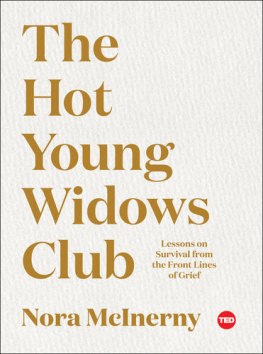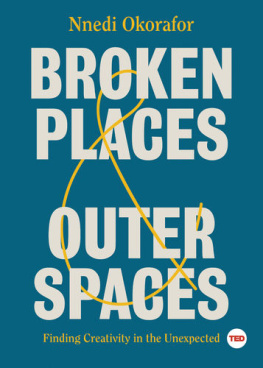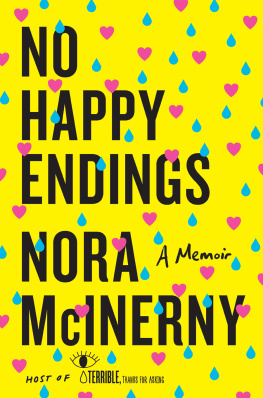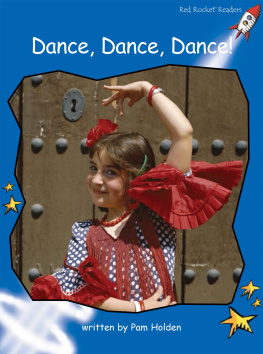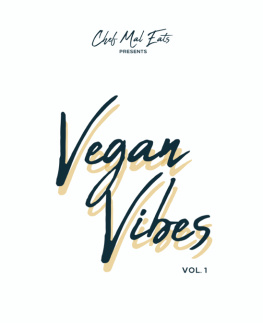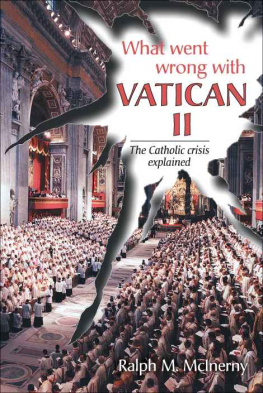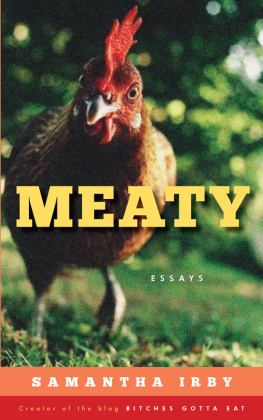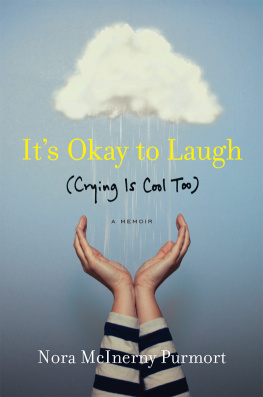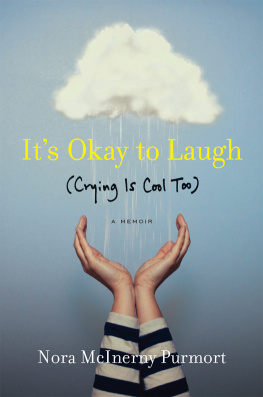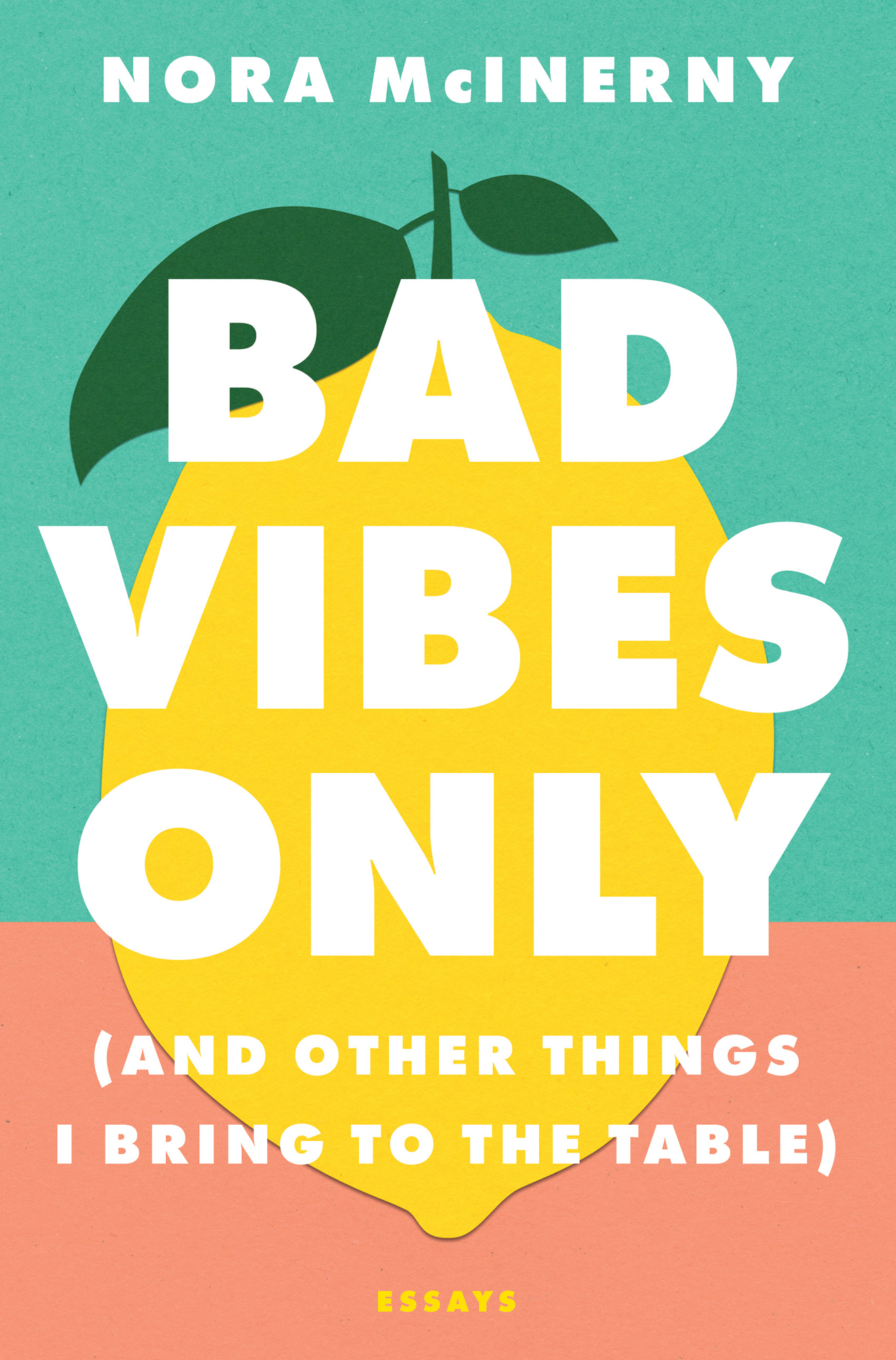Contents
Guide
Nora McInerny
Bad Vibes Only
(and Other Things I Bring to the Table)
Essays
For The Terribles.
Ive never been a natural, all I do is try, try, try.
TAYLOR SWIFT, MIRRORBALL
Before We Begin
W hen my son was two years old, he would greet new children at the park by saying, Im Ralphie! My dad is dead! The children tended not to care very much about Ralphs deceased father, but any parent or caregiver around them would freeze, trying to will their faces to project an air of inquisitiveness rather than anguish.
Yes! Id say. Thats correct! And the two of us would go about our business, which meant me standing at the bottom of a slide Ralph would never go down, while he stood at the top and made sure every other kid got a turn. Some days I might offer an insincere apology to the person whose day seemed to be ruined by the facts of Ralphs and my life, and some days I might even offer up the tidbits I could sense they were craving: How did he die? How old was he? Did he deserve it?
If youre craving those same tidbits, I dont blame you. And the answers are: Brain Cancer. Thirty-five. And no, not even a little bit. Ralphs limited vocabulary and sense of social norms had freed him from the tyranny of conversational niceties and allowed him to state the facts, however awful they be. Soon enough, I knew, he would learn to lie like the rest of us: by omission, by wrapping the unruly threads of his life tight, or trimming them off entirely. He will learn that the best way to keep people comfortable is to hide your own discomfort or deny it entirely. He will learn to fake it until he makes it, to betray himself in a million ways, just like his mother.
I dont know when I learned that fine was the correct answer to how are you? but nobody ever had to explicitly tell me that well, Im teetering on the edge of a nervous breakdown is definitely not the answer your colleague is looking for while you pass each other in the hallways between your many overlapping meetings. It doesnt take a psychology degree to understand that some things are just more pleasant than others, and that as comfort-seeking mammals with disposable income we are attracted to the pleasant, the easy.
And yes, we know that life is hard, but we also really want it to be hard in ways that are manageable and more inconvenient than difficult. We want our setbacks to be setting us up for comebacks, and more than anything, we want to be able to alchemize our pain into something shiny and good: a lesson learned, a warning sign for others. Our suffering is just a vehicle for our self-improvement.
Ha.
Good Vibes Only makes a cute saying for a mug, but a pretty ominous interpersonal standard. My bookshelves and credit card statements will tell you that Ive tried my best to smooth all my rough edges, to master my own mind and attract the kind of life I want. Depending on the aperture, it might look like Ive done it: I have a handsome (second) husband named Matthew and a blended family of four children, and our holiday cards (which arrive after the holidays) are printed on thick cardstock and sometimes feature professional photos. But a family can only blend when other family units have fallen apart, and five out of six of the people smiling at you from that card are still sorting through the residual trauma of what was lost before this was gained.
I dont put that on the back of the card, but maybe I should. The vibes out here are a mixed bag, and mostly out of our control, like the economic forces that determine who can pay their rent and who lives in an encampment on the side of the freeway, or the random multiplication of cells that showed up as a brain tumor in my first husbands handsome head.
I dont want to live in a world where the only vibes are bad, but I cannot stay for long in a room where the only vibes allowed are the pleasant ones, either. I was a child who lay in bed crying about pain I hadnt yet experiencedlike the deaths of my very alive parents, who were doing the New York Times crossword puzzle in bed down the halland a teenager who read Carson McCullers. I was also a child who delighted in physical comedy and fantasized about growing up to marry Chris Farley (may he Rest in Peace). I grew up to be an adult whose job is to speak to strangers about the hardest things theyve been through, to help them tell the truth about their own discomfort so that other strangers can learn to be comfortable with the discomfort of others in the comfort of wherever they listen to podcasts. And I also grew up to be an adult with an abiding passion for early aughts reality television, a die-hard Swiftie, and the kind of person whoregrettablyends phone calls by saying smell ya later.
I have always been the saddest happy person I know (or maybe the happiest sad person I know), the middle part of a Venn diagram that Id caption The Life of The Party Pooper.
There are plenty of books out there promising you a better version of your life, books where the author uses their own narrow personal experiences to offer universal advice to the reader. Those books sell very well, and most of them are on my bookshelves. But this book is for people who cannot help but put a little sprinkle of sadness on their happiest memories, or who know that life is short and still fill those waking hours with long-held grudges against former colleagues whose names they cannot recall. I welcome and respect all of your vibes. Here are some of mine.
1 It Hurts to Be Beautiful
T he woman standing in front of me with a syringe has a question. She is holding an iPad opened to a PDF document informing me about the risks of this procedure, and Ive scrolled through it to get to the small box that declares I understand the risks, which I click without hesitation, swiping my finger across the screen to approximate my signature.
Im proudly middle-aged, though that seems to rile up anyone older than me. Ive spent nights in hospital beds and afternoons in chemo infusion rooms. Surrounded by the sick, I have felt a new appreciation for my healthy body: the miracle of my two lungs and my countless cells, every piece of me working in harmony together to sustain this life of mine. Aging is a gift, the goal of everything my body does for me, thanklessly, day and night. I want to experience aging in all its fullness. I do not, however, want to look it. I feel a slight pinch, experience a bit of redness, and in two weeks I see those lines relax and disappear.
Is this:
- Self-care
- A submission to patriarchal beauty standards that require women to cling to their youth
- An exercise in futility
- All of the above
- None of the above
I came of age in what may be the tackiest era of female beauty: the late 1990s and early 2000s. The turn of that century brought major enhancements in the accentuation of femininity, and a celebration of the effort. The Playboy to Prime Time pipeline was filled with silicone: Pamela Andersons breast implants bouncing slowly and dramatically in her tiny red bathing suit during the opening credits of Baywatch, Jenny McCarthys chest pulling against her baby tees on Singled Out. I wasnt allowed to watch either of these things, but I learned how to turn off the TV the moment my parents hit the garage door opener, sprinting up the stairs and into my bed with an open book as if Id whiled away the after-school hours getting lost in American History instead of soaking in the much sexier American Present. I was built like a two-by-four and dressed like an extra in

